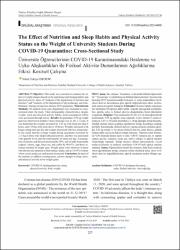| dc.contributor.author | Erdem, Nihal Zekiye | |
| dc.date.accessioned | 2023-06-07T08:44:40Z | |
| dc.date.available | 2023-06-07T08:44:40Z | |
| dc.date.issued | 2023 | en_US |
| dc.identifier.citation | Erdem, N. Z. (2023). The effect of nutrition and sleep habits and physical activity status on the weight of university students during COVID-19 quarantine: Cross-sectional study. Turkiye Klinikleri Journal of Health Sciences, 8(2), 227-240. https://doi.org/10.5336/healthsci.2022-94690 | en_US |
| dc.identifier.issn | 2536-4391 | |
| dc.identifier.uri | https://doi.org/10.5336/healthsci.2022-94690 | |
| dc.identifier.uri | https://hdl.handle.net/20.500.12511/11036 | |
| dc.description.abstract | Objective: This study was executed to examine the ef- fect of weight changes based on the nutritional and sleeping habits and physical activity status of “students of the department of nutrition and dietetics” and “students of the department of physiotherapy and reha- bilitation” during coronavirus disease-2019 quarantine. Material and Methods: 50 students from each department were included in cross- sectional study the study. Their demographic characteristics, height, weight, sleep and physical activity habits, food consumption habits were questioned through survey. Results: In quarantine, 0.95 kg weight gain was observed in students whose mean age was 21.26±1.2 years. It was found that the weights increased by 2.45 kg with sleep less than 6 hours, and 1.18 kg with sleep above 10 hours. Weights increased with longer sitting time per day and weights decreased with less sitting time. It was found that the average weight during quarantine increased by 2.51 kg in those who lacked physical activity, and this was associated with appetite level, and the total number of meals per day. Consump- tion of pastries and desserts increased by 50%, and of milk, homemade yoghurt, cheese, eggs, black tea, and coffee by 40-67%, and these in- creases resulted in weight gain. Weight gains were observed in those who did not pay attention to their energy intake, and in 34-45% of those whose social media use and anxiety increased.Conclusion: In most of the students, in addition to eating more, adverse changes in sleep, stress, and physical activity led to weight gains. | en_US |
| dc.description.abstract | Amaç: Bu çalışma, “beslenme ve diyetetik bölümü öğrencileri ile” “fizyoterapi ve rehabilitasyon bölümü öğrencilerinin” koronavirüs hastalığı-2019 karantinasındaki beslenme ve uyku alışkanlıkları ile fi- ziksel aktivite durumlar ına göre a ğırlık değişimlerinin etkisi incelen- mek amacıyla yapıldı. Gereç ve Yöntemler: Kesitsel tipteki çalışmaya her bölümden 50 öğrenci dâhil edildi. Anketle demografik özellikleri, boy, ağırlık, uyku ve fiziksel aktivite al ışkanlıkları, besin tüketimleri sorgulandı. Bulgular: Yaş ortalamaları 21,26±1,2 yıl olan öğrencilerde karantinada, 0,95 kg a ğırlık artışı saptandı. Uyku süreleri 6 saatin al- tındaysa 2,45 ve 10 saatin üzerindeyse 1,18 kg ağırlığın arttığı bulundu. Günlük oturma süresi uzadıkça ağırlıkların arttığı, kısaldıkça azaldığı görüldü. Karantinada, fiziksel aktivite yapmayanlarda ortalama ağırlı- ğın 2,51 kg artt ığı ve bu art ışın fiziksel aktivite, i ştah düzeyi, günlük toplam öğün sayısıyla ilişkili olduğu bulundu. Tüketimi artan besinle- rin %50 oranında hamur işleri ve tatlı; %40-67 oranıyla süt, ev yapımı yoğurt, peynir, yumurta, siyah çay, kahve oldu ğu ve a ğırlık artışları oluşturduğu saptand ı. Ald ığı enerjiye dikkat etmeyenlerde, sosyal medya kullanımı ve endişesi artanların %34-45’inde a ğırlık artışları saptandı. Sonuç: Öğrencilerin önemli bir oranının, daha fazla yemeyle vücut ağırlıklarının arttığı; olumsuz yönde etkilenen uyku, stres ve fi- ziksel aktivite de ğişikliklerinin, ağırlık artışlarına neden oldu ğu sap- tandı. | en_US |
| dc.language.iso | eng | en_US |
| dc.publisher | Turkiye Klinikleri | en_US |
| dc.rights | info:eu-repo/semantics/openAccess | en_US |
| dc.rights | Attribution-NonCommercial-NoDerivatives 4.0 International | * |
| dc.rights.uri | https://creativecommons.org/licenses/by-nc-nd/4.0/ | * |
| dc.subject | COVID-19 | en_US |
| dc.subject | Feeding Behavior | en_US |
| dc.subject | Sleep | en_US |
| dc.subject | Physical Activity | en_US |
| dc.subject | Body Weight | en_US |
| dc.subject | COVID-19 | en_US |
| dc.subject | Beslenme Davranışı | en_US |
| dc.subject | Uyku | en_US |
| dc.subject | Fiziksel Aktivite | en_US |
| dc.subject | Vücut Ağırlığı | en_US |
| dc.title | The effect of nutrition and sleep habits and physical activity status on the weight of university students during COVID-19 quarantine: Cross-sectional study | en_US |
| dc.title.alternative | Üniversite öğrencilerinin COVID-19 karantinasındaki beslenme ve uyku alışkanlıkları ile fiziksel aktivite durumlarının ağırlıklarına etkisi: Kesitsel çalışma | en_US |
| dc.type | article | en_US |
| dc.relation.ispartof | Turkiye Klinikleri Journal of Health Sciences | en_US |
| dc.department | İstanbul Medipol Üniversitesi, Sağlık Bilimleri Fakültesi, Beslenme ve Diyetetik Bölümü | en_US |
| dc.authorid | 0000-0001-7046-9515 | en_US |
| dc.identifier.volume | 8 | en_US |
| dc.identifier.issue | 2 | en_US |
| dc.identifier.startpage | 227 | en_US |
| dc.identifier.endpage | 240 | en_US |
| dc.relation.publicationcategory | Makale - Ulusal Hakemli Dergi - Kurum Öğretim Elemanı | en_US |
| dc.identifier.doi | 10.5336/healthsci.2022-94690 | en_US |
| dc.institutionauthor | Erdem, Nihal Zekiye | |
| dc.identifier.trdizinid | 1177547 | en_US |



















